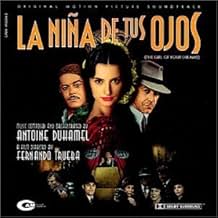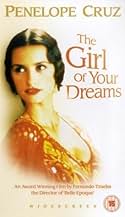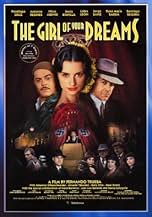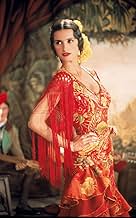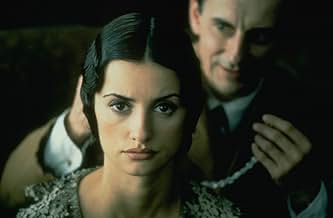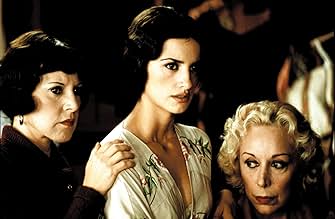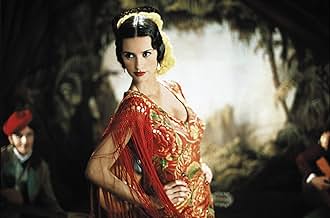NOTE IMDb
6,7/10
4,6 k
MA NOTE
Ajouter une intrigue dans votre langueA company of Spanish movie makers leaves Franco's Spain and moves to Hitler's Germany to produce a film. Problems soon arise.A company of Spanish movie makers leaves Franco's Spain and moves to Hitler's Germany to produce a film. Problems soon arise.A company of Spanish movie makers leaves Franco's Spain and moves to Hitler's Germany to produce a film. Problems soon arise.
- Réalisation
- Scénario
- Casting principal
- Récompenses
- 14 victoires et 16 nominations au total
Rosa Maria Sardà
- Rosa Rosales
- (as Rosa María Sardá)
Miroslav Táborský
- Václav
- (as Mirosláv Táborský)
Juan Luis Galiardo
- Embajador
- (as Juan Luís Galiardo)
Jan Preucil
- Maisch
- (as Jan Přeučil)
Borivoj Navrátil
- Henkel
- (as Bořivoj Navrátil)
Avis à la une
Without trying to offend anybody I have to agree with another reviewer in that an explanation for the bad reception of this film among the non-Spanish speakers reviewers was exactly that: Spanish is not their first language and this is sometimes, as another reviewer has pointed out, a difficult film to understand if you are not a native speaker. A full understanding of the dialogue would help to clarify some of the bizarre scenes in the film. It might not be the best script written by Rafael Azcona, without any doubt one of the best scriptwriters in the history of Spanish cinema, but at times it is hilarious. A better grasp of Spanish history and culture would also come quite handy. So what else can you say about Penelope Cruz in the scene where she dances and sings for Goebbels?. As one her shoe is missing, she unintentionally imitates Goebbles, as she approaches him in a frontal shot, who is lame.
Jokes on the Spanish fascist are more than just clichés. For example the cuckold Spanish ambassador played by Juan Luis Galiardo and his nymphomaniac wife, played by Maria Barranco. And the wisecracking remark made by the pro-fascist Spanish troupe leading man, Jorge Sanz, wooded by his German counterpart "Yo doy todo por mi patria menos mi culo", he would give anything for his country except his ass. They are both an amusing pisstaking on fascist patriotic macho culture. This subject of patriotism being a hot issue right now in Spain where the right-wing government of Aznar is endorsing the notion of "Patriotismo Constitucional" or Constitutional Patriotism developed by the German philosopher Jürgen Habermas. Unashamedly, the film upholds the necessity to produce espanoladas. As the film director Blas Fontiveros, played by Antonio Resines, remarks that the life of a Spanish hero has more relevance to Spanish audiences, as they feel more identified, than for example Al Capone's. 5 Spanish (espanoladas) films were, in fact, made in Nazi Germany. Two starred by Imperio Argentina and another 2 by Estrellita Castro both stars of the "cine folclorico espanol".
As already remarked by some reviewers the film copies scenes from other films, the most obvious being its final sequence, which is a rip off of the end of Casablanca, but to suggest that it is a carbon copy of such and such a film is pure overstatement and a rather facile critique of the film. Yet its politics are not at all convincing, not to say rather naïve. The introduction of the Russian Jewish character signals the fall of the film into sentimental humanism and vacuous romantic trifle from where the film does not recover. Nevertheless La Nina de tus Ojos has its charms too and I found it extremely funny. The cast is excellent (Penelope Cruz playing an andalusian, a role she had already done in Almodovar's "Todo Sobre mi Madre" as a prostitute). Resines and Sanz are a surprise as well as Santiago Segura. But special mention deserves Miroslav Táborský, playing Vaclav the interpreter. Subtle looks at Macarena tell of his unrequited love for her. His increasing fascination with Macarena moves him away from his non-interventionist stand to resignedly accept his fate by the end of the film, along with Fontiveros who is Macarena's lover, at the hands of the Nazi. Yet this is never overdone as the change of views underwent by the other characters towards the Nazi regime, in particular the case of Julian Torralba. This little subplot of the film is quite moving rather sentimental and its quiet essence contrast sharply with the bombardment of dialogue coming from the rest of the cast.
Jokes on the Spanish fascist are more than just clichés. For example the cuckold Spanish ambassador played by Juan Luis Galiardo and his nymphomaniac wife, played by Maria Barranco. And the wisecracking remark made by the pro-fascist Spanish troupe leading man, Jorge Sanz, wooded by his German counterpart "Yo doy todo por mi patria menos mi culo", he would give anything for his country except his ass. They are both an amusing pisstaking on fascist patriotic macho culture. This subject of patriotism being a hot issue right now in Spain where the right-wing government of Aznar is endorsing the notion of "Patriotismo Constitucional" or Constitutional Patriotism developed by the German philosopher Jürgen Habermas. Unashamedly, the film upholds the necessity to produce espanoladas. As the film director Blas Fontiveros, played by Antonio Resines, remarks that the life of a Spanish hero has more relevance to Spanish audiences, as they feel more identified, than for example Al Capone's. 5 Spanish (espanoladas) films were, in fact, made in Nazi Germany. Two starred by Imperio Argentina and another 2 by Estrellita Castro both stars of the "cine folclorico espanol".
As already remarked by some reviewers the film copies scenes from other films, the most obvious being its final sequence, which is a rip off of the end of Casablanca, but to suggest that it is a carbon copy of such and such a film is pure overstatement and a rather facile critique of the film. Yet its politics are not at all convincing, not to say rather naïve. The introduction of the Russian Jewish character signals the fall of the film into sentimental humanism and vacuous romantic trifle from where the film does not recover. Nevertheless La Nina de tus Ojos has its charms too and I found it extremely funny. The cast is excellent (Penelope Cruz playing an andalusian, a role she had already done in Almodovar's "Todo Sobre mi Madre" as a prostitute). Resines and Sanz are a surprise as well as Santiago Segura. But special mention deserves Miroslav Táborský, playing Vaclav the interpreter. Subtle looks at Macarena tell of his unrequited love for her. His increasing fascination with Macarena moves him away from his non-interventionist stand to resignedly accept his fate by the end of the film, along with Fontiveros who is Macarena's lover, at the hands of the Nazi. Yet this is never overdone as the change of views underwent by the other characters towards the Nazi regime, in particular the case of Julian Torralba. This little subplot of the film is quite moving rather sentimental and its quiet essence contrast sharply with the bombardment of dialogue coming from the rest of the cast.
OK, I've never been a great fan of Penelope Cruz, but I was going to take my Spanish exams two weeks before I watched this film and I thought it would be good practice. I was pleasantly surprised! The movie takes place in 1938 and shows the story of a Spanish film crew, one that is funded by Franco, which is invited by Goebels to Germany to make a Spanish and a German version of the film "La Nina De Tus Ojos" (freely translated into something like "The Girl Of Your Dreams"). And when they arrive at the studios of UFA, the mayhem begins! First of all, I would like to note that this is a great production. It's obvious that plenty of money were thrown into it, a thing that is obvious in some scenes. There are some scenes that are very funny and some characters in general make you laugh from the moment they appear on screen. Personally I will never forget that dog in the beginning! You will know when you'll see it.
Trueba's directing is very good. Although I had heard his name before, I hadn't had the chance to watch some other movie of his before this one. I will try to in the future. He managed to keep the whole thing running, never making the viewer get bored at a single moment. And well, at those moments when the plot had started getting a bit slow, he threw in Penelope Cruz's breasts! What I didn't like was the political statements this movie tried to make. They seemed completely out of place and most of them were childish. First of all, all those arguments about the Jews that Cruz's character made hardly had anything to do with what was going on at the moment and they seemed as if they were forced. In fact, I can't understand why the Jewish character was there. He is the only one among the gypsies that were brought to the studio, or at least they don't show us any more. But the Germans didn't place Jews and gypsies in the same concentration camps! Anyway... Some times it just felt as if the producers hoped that they could sell this film to Hollywood (I hope you understand the connection). And of course the way they portrayed Goebels was way too cartoonish. Of course I know this is a comedy and Goebels had indeed some very ridiculous things going on about him and, yes, he did sleep with many actresses but well, they show him way too silly most of the times...
But if you set aside the moments where the story tries to make itself look really serious, this is a good and very enjoyable film. In fact, sometimes you will be surprised by the skill Trueba shows here. Spanish cinema has been giving us many gems in the last few years and I hope it will continue this way!
Trueba's directing is very good. Although I had heard his name before, I hadn't had the chance to watch some other movie of his before this one. I will try to in the future. He managed to keep the whole thing running, never making the viewer get bored at a single moment. And well, at those moments when the plot had started getting a bit slow, he threw in Penelope Cruz's breasts! What I didn't like was the political statements this movie tried to make. They seemed completely out of place and most of them were childish. First of all, all those arguments about the Jews that Cruz's character made hardly had anything to do with what was going on at the moment and they seemed as if they were forced. In fact, I can't understand why the Jewish character was there. He is the only one among the gypsies that were brought to the studio, or at least they don't show us any more. But the Germans didn't place Jews and gypsies in the same concentration camps! Anyway... Some times it just felt as if the producers hoped that they could sell this film to Hollywood (I hope you understand the connection). And of course the way they portrayed Goebels was way too cartoonish. Of course I know this is a comedy and Goebels had indeed some very ridiculous things going on about him and, yes, he did sleep with many actresses but well, they show him way too silly most of the times...
But if you set aside the moments where the story tries to make itself look really serious, this is a good and very enjoyable film. In fact, sometimes you will be surprised by the skill Trueba shows here. Spanish cinema has been giving us many gems in the last few years and I hope it will continue this way!
I have just got this film on DVD I saw it a couple of years ago during a Penelope Cruz season in Manchester, I enjoyed it then & I enjoyed it just as much now.
As a non-Spanish speaker I still got the comic elements & the historical references to a point & now I have it on DVD I can go back & check any bits I have missed.
I just like the characters in this film, the fish out of water element of the Spanish in Nazi Germany is very funny the off the cuff one liners are priceless.
Cruz & Resinas may be the focus of the film & they are lead the way but everyone gets a moment to shine in this film, segura is my favourite he always steals some or all the limelight in any film he appears.
I would heartily recommend this film it may not be up to Belle Epoque but its not far behind.
As a non-Spanish speaker I still got the comic elements & the historical references to a point & now I have it on DVD I can go back & check any bits I have missed.
I just like the characters in this film, the fish out of water element of the Spanish in Nazi Germany is very funny the off the cuff one liners are priceless.
Cruz & Resinas may be the focus of the film & they are lead the way but everyone gets a moment to shine in this film, segura is my favourite he always steals some or all the limelight in any film he appears.
I would heartily recommend this film it may not be up to Belle Epoque but its not far behind.
The cast is excellent and the movie is quite funny and moving. Not to mention based on historical facts. (Spanish actors doing movies at the UFA studios in the thirties). The setting, the costumes and photo -brilliant. However there's one big draw back: The plot goes "Thummpph!" after an hour and suddenly becomes a French farse (people banging doors, hiding in closets and becoming hysterical) and it all falls apart. It does pick up at the end though. It's not the greatest film ever made but it's watchable. And Penelope Cruz...what can I say? She's fabulous.
A rather unusual Spanish film, to say the least: an Andalucían theatre group go to Nazi Germany to make a film and get swallowed up in all the nasty things going on there, which in itself is rather cute, given all the nasty things that had been going on back in Spain.
The mixture of drama with a quizzical farcical touch of Spanish black humour thrown in does not quite work with me, I'm afraid. Fernando Trueba, as ever, has done his job well. The scene-setting is truly exceptional; the dialogues at times are really good but at others tend to jar on the ear making me wonder if this is the same Rafael Azcona (Logroño, 1926) as in other far better scripts; and hearing Penélope Cruz with an Andalucían accent is definitely something not to be missed at any price .!! Oh, she's from Madrid, by the way, and that city has its own dialect. I've never had much sympathy for Antonio Resines, despite having to acknowledge that in this film he is pretty good and I should say the same of Loles León who I have seen a few times in very trivial TV paraphernalia. Rosa María Sardá is of course splendid, her live-theatre upbringing lending a good hand to the occasion.
So the ingredients are more or less right, but the whole just does not convince me; perhaps the story-line, perhaps the rather strange sense of humour in bizarre situations...
Well, never mind: Penelope Cruz is `La Niña de Mis Ojos' (The Girl of My Eyes) whenever and wherever she pops up, which, thank goodness, is nice and frequent.
The Spanish spoken is rather difficult and so is for people at an advanced level; otherwise the film should be seen dubbed or with subtitles.
The mixture of drama with a quizzical farcical touch of Spanish black humour thrown in does not quite work with me, I'm afraid. Fernando Trueba, as ever, has done his job well. The scene-setting is truly exceptional; the dialogues at times are really good but at others tend to jar on the ear making me wonder if this is the same Rafael Azcona (Logroño, 1926) as in other far better scripts; and hearing Penélope Cruz with an Andalucían accent is definitely something not to be missed at any price .!! Oh, she's from Madrid, by the way, and that city has its own dialect. I've never had much sympathy for Antonio Resines, despite having to acknowledge that in this film he is pretty good and I should say the same of Loles León who I have seen a few times in very trivial TV paraphernalia. Rosa María Sardá is of course splendid, her live-theatre upbringing lending a good hand to the occasion.
So the ingredients are more or less right, but the whole just does not convince me; perhaps the story-line, perhaps the rather strange sense of humour in bizarre situations...
Well, never mind: Penelope Cruz is `La Niña de Mis Ojos' (The Girl of My Eyes) whenever and wherever she pops up, which, thank goodness, is nice and frequent.
The Spanish spoken is rather difficult and so is for people at an advanced level; otherwise the film should be seen dubbed or with subtitles.
Le saviez-vous
- AnecdotesWhile fictional, the film is strongly inspired by the production of the films Nuits d'Andalousie (1938) and Andalusische Nächte (1938), two versions of the same story shot simultaneously in Berlin, one in Spanish and one in German, both starring Imperio Argentina.
- Crédits fousThe entire credits are at the start of the film, with the end credits just recapping the main cast, with the other actors not listed alongside the character they play.
- ConnexionsFeatured in Cinemania: I anodos kai i ptosi tou Nazismou (2008)
- Bandes originalesLos piconeros
Written by Juan Mostazo and Ramón Perelló
Orchestrated by Antoine Duhamel
Performed by Arabia Martín
Meilleurs choix
Connectez-vous pour évaluer et suivre la liste de favoris afin de recevoir des recommandations personnalisées
- How long is The Girl of Your Dreams?Alimenté par Alexa
Détails
- Date de sortie
- Pays d’origine
- Sites officiels
- Langues
- Aussi connu sous le nom de
- The Girl of Your Dreams
- Lieux de tournage
- Sociétés de production
- Voir plus de crédits d'entreprise sur IMDbPro
Box-office
- Budget
- 4 200 000 € (estimé)
Contribuer à cette page
Suggérer une modification ou ajouter du contenu manquant

Lacune principale
By what name was La fille de tes rêves (1998) officially released in Canada in English?
Répondre
